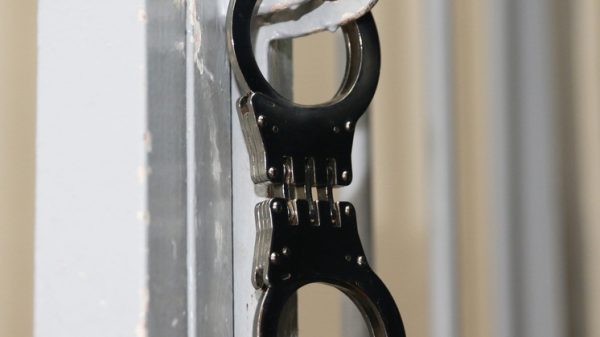 Despite all the criticism she receives from the left, Meloni is an innovative figure. Photo: REUTERS/Juan Medina
Despite all the criticism she receives from the left, Meloni is an innovative figure. Photo: REUTERS/Juan Medina
For Italian Prime Minister Georgia Meloni, this was the last straw.
Her partner of almost ten years, TV journalist Andrea Giambruno, was recorded making lustful comments off-air. In one of two clips aired by a rival channel, he can be heard asking a female colleague why he didn't meet her sooner. In another, he suggested forming a “three” or “four” with a female colleague.
Even for a right-wing politician in Italy, a country not known for progressive gender relations, this was too much. Two days later, Meloni, 46, the first female prime minister in Italian history, announced that she and Giambruno had separated. In her Instagram post, she wrote: “This ends my relationship with Andrea Giambruno, which lasted almost 10 years.
“I thank him for the wonderful years we spent together, for the difficulties we went through, and for giving me the most important thing in my life — our daughter Ginevra. Our paths have diverged for some time, and it’s time to admit it.”
This isn't the first time Giambruno's comments have stumped him. In September, Meloni was forced to defend him after he said that if women don't want to be raped, they shouldn't get drunk. She said his words were «misinterpreted». In July, he dismissed the climate crisis by saying that «heat in the summer is not big news.»
The rift in Meloni's personal life comes amid one of the most remarkable developments in recent European politics. In just over a year, she has gone from being a hated figure in much of Italy, accused of all shades of far-right views including outright fascism, to an increasingly respected center of stability. A year ago, you would have been hard pressed to find people who would admit to voting for Meloni despite the electoral evidence. Today, even some Italian leftists are becoming reluctant to admit that they are not against it. Her ratings have never been higher, with a poll this summer showing 57 percent of Italians approve of her, compared with Rishi Sunak's 25 percent approval.
 A recent poll showed 57 percent of Italians approve of her, compared with Rishi Sunak's 25 percent approval. Credit: FILIPPO ATTILI/CHIGI PALACE PRESS OFFICE/HANDOUT/EPA-EFE/Shutterstock
A recent poll showed 57 percent of Italians approve of her, compared with Rishi Sunak's 25 percent approval. Credit: FILIPPO ATTILI/CHIGI PALACE PRESS OFFICE/HANDOUT/EPA-EFE/Shutterstock
The changes are just as noticeable outside Italy. European leaders were grateful to her for her consistent support for Ukraine and the EU. When she was elected, President Biden said she was a “threat to democracy.” But when he welcomed her to the White House in July, he said, «We've become friends,» adding, «I hope you'll be kind to me.»
Meloni was elected last September as leader of the Brothers of Italy party in a coalition of right-wing parties to form Italy's most conservative government since Mussolini. Her victory was the culmination of a political ascent that began in childhood. She was born in Rome in 1977, the second daughter of Francesco Meloni, a tax consultant, and Anna, who later became a writer. Her father left the family when Georgia was one and moved to the Canary Islands, where he had four children with a new partner and was later sentenced to nine years in prison for drug dealing. When she was four years old, their house burned down and they moved to Garbatella, a notorious area of the city. Her family described her childhood as «difficult». Meloni attributed some of her political views to this time. In an Instagram post about the breakup, she talked about her difficult upbringing.
“I will protect who we were,” she wrote about herself and Giambruno. “I will protect our friendship and at all costs protect a seven-year-old girl who loves her mother and father in a way that I could not love mine.”
 Melonie was with TV presenter Andrea Giambruno for almost 10 years. Photo: Alessandro Bremek/LaPresse via AP
Melonie was with TV presenter Andrea Giambruno for almost 10 years. Photo: Alessandro Bremek/LaPresse via AP
When she was 15, she joined the youth group of the Italian Social Movement, a neo-fascist party founded by Mussolini supporters. After it disbanded in 1995, she joined its successor, the National Alliance, which moved away from fascism towards more traditional Conservative politics. In 2008, when she was 31, Silvio Berlusconi appointed her as his youth minister. She founded the Brothers of Italy in 2012 with Ignazio La Russa and Guido Crosetto, two other right-wing politicians. They took their name from the first words of the Italian anthem. Her pro-family and anti-LGBT politics were made clear in a speech she gave in 2019 when she said, “I am Georgia. I am a woman, I am a mother, I am Italian, I am a Christian.” Two DJs included the slogan in a song that was intended to be satirical, but its popularity only increased its fame.
Her election victory came after Mario Draghi's government collapsed last year when he lost the support of his coalition partners. As she prepared to form a government, she fell out with her former champion Silvio Berlusconi. He called her «patronizing, bossy, arrogant… [and] insulting,» perhaps with a hint of pride.
True to its far-right beliefs, Meloni's government has cut benefits for workers and introduced tough laws against same-sex parents and NGO rescue ships. She is against abortion and euthanasia. She has taken strong views on issues of immigration, family and gender: critics say that although she has softened her statements, her principles remain unchanged. But on the economic front, it has largely stuck to Draghi's scheme, which has stabilized the listing ship. She maintains ties with Brussels, perhaps remembering that Italy was one of the biggest beneficiaries of Covid money. While she praised Donald Trump and Vladimir Putin before her election, she has now forged relationships with centrists such as Emmanuel Macron and Olaf Scholz, and maintains a friendship with Hungarian Prime Minister Viktor Orban.
 Joe Biden said of Meloni: “We became friends.” Photo: AP Photo/Evelyn Hockstein
Joe Biden said of Meloni: “We became friends.” Photo: AP Photo/Evelyn Hockstein
There are parallels with Margaret Thatcher, another Conservative woman who came to power in the chaos of a left-wing government.
Like Meloni, Thatcher had to contend with an absent partner: in her case in 1964, when her husband Denis had a nervous breakdown and went to South Africa for two months for treatment, leaving his wife at home with their twins.
“It was not just that he was exhausted and confused, but perhaps their marriage was over,” wrote Thatcher’s official biographer (and former Telegraph editor) Charles Moore. A female prime minister is one thing, but a divorced female prime minister might be a tough sell. Despite all the criticism she receives from the left, Meloni is an innovative figure.
The separation from Giambruno could further soften her public image. Whatever one's political views, anyone can sympathize with a woman who is being mistreated by their partner. Italian prime ministers tend to have a short shelf life. Meloni may yet lead that rarest of things: an Italian government that will serve a full term. It won't be easy, but Italians, like all good Catholics, have always had a soft spot for single mothers.


























































Свежие комментарии